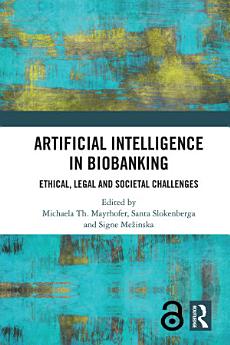Artificial Intelligence in Biobanking: Ethical, Legal and Societal Challenges
About this ebook
Although AI has the potential to speed up health research, the book considers numerous questions that the technology poses, from the building of trust to the prevention of harm to individuals, vulnerable groups or entire populations. Examining the tension between scientific progress and safeguarding of individual rights, and covering key issues such as accountability, data bias, transparency, and liability, the book considers the legal landscape in which biobanks operate, and what layers of governance are required to oversee such an important resource in a fluid technological age.
A timely volume that brings together scholars and experts from social sciences, ethics, and law, this important book will interest researchers and professionals in Biomedicine, Law, and the broader Health Sciences.
The Open Access version of this book, available at http://www.taylorfrancis.com, has been made available under a Creative Commons Attribution CC BY 4.0 license.
About the author
Michaela Th. Mayrhofer is a political scientist, historian, and sociologist specializing in the governance of life sciences. She is founder of Papillon Pathways e.U. and the lead of ELSI at the Medical University of Innsbruck, Institute of Human Genetics, both Austria. Michaela has served as Head of ELSI Services & Research Department (2019–2025) and Co-Interim Director General (2020) at BBMRI-ERIC, Austria. She is a review editor for Frontiers in Digital Health, as well as an independent ethics advisor to several consortia and organizations, and a research ethics expert for the European Commission.
Santa Slokenberga is an associate professor in medical law and a senior lecturer in administrative law at the Faculty of Law, Uppsala University, Sweden. She is a board member of the Nordic Permed Law Network and the European Association of Heath Law, as well as an independent ethics advisor to several consortia and organizations.
Signe Mežinska is a bioethicist and sociologist specializing in biomedical research ethics and medical ethics. She leads a research group at the University of Latvia, focusing on ethical challenges in the development and application of biotechnologies and the protection of patients' and research participants' rights. Signe has served as an ethics expert for international organizations, including UNESCO's International Bioethics Committee, WHO, and the European Commission.




